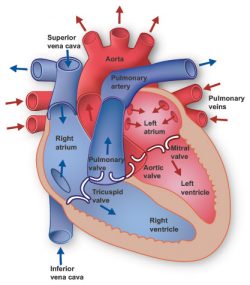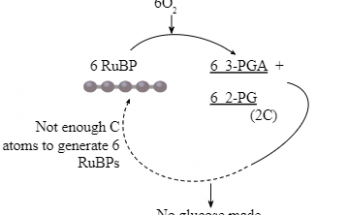Heart
- The Heart is a muscular organ in the human body responsible for the pumping Blood throughout the body. It is located in the chest, behind the sternum and slightly to the left.
- Heart has four chambers: the left and right atria and the left and right ventricles.
- Blood enters the Heart through the vena cava and is pumped out through the aorta. Oxygenated Blood from the lungs is pumped into the left atrium and then into the left ventricle, from where it is pumped out to the rest of the body. Deoxygenated Blood from the body is returned to the right atrium and then pumped into the right ventricle, from where it is pumped back to the lungs to be oxygenated.
13 Important Functions of Heart
Functions of Heart are as follows –
- Pumps Blood – The primary and the most important function of the Heart is to pump Blood throughout the body. It does this by contracting and relaxing its muscular walls to push Blood through the Blood vessels.
- Oxygenating Blood –Heart is responsible for oxygenating the Blood that it pumps. This is done through the circulatory system, which brings oxygen-rich Blood from the lungs to the Heart and then pumps it out to the rest of the body.
- Provides Oxygen and Nutrients – Heart is responsible for delivering oxygen and nutrients to the body’s cells, tissues and organs. Oxygenated Blood is delivered to the body through the arteries, while deoxygenated Blood is returned to the Heart through the veins.
- Maintains Blood Flow –Heart helps to ensure that Blood is flowing consistently and efficiently throughout the body. It does this by contracting and relaxing its walls at a regular rhythm, which helps to keep the Blood moving.The Heart uses a network of Blood vessels of arteries and veins to deliver Blood to different parts of the body. It also regulates the amount of Blood flow to different organs based on their needs.
- Regulates Blood Pressure – Heart helps to maintain a healthy Blood pressure by adjusting the rate and force of its contractions. This helps to ensure that the Blood is flowing at the right rate and pressure to support the body’s needs.
- Controls Heart Rate – Heart’s rate is controlled by specialised cells called pacemaker cells, which send out electrical signals to regulate the Heart’s contractions.
- Produce Hormones – Heart produces hormones, such as atrial natriuretic peptide, which help to regulate Blood pressure and fluid balance in the body.
- Removes Waste Products – Heart also helps to remove waste products from the body, such as carbon dioxide, through the Circulatory system.
- Regulates Body Temperature – The Heart helps to regulate body temperature by pumping warm Blood to the body’s surface to release heat and cold Blood to the body’s core to conserve heat.
- Regulates Electrolyte Balance – The Heart plays a role in maintaining the balance of electrolytes in the body, such as sodium, potassium and calcium, which are important for proper body functioning.
- Maintains Homeostasis – Heart helps to maintain homeostasis, or balance, in the body by ensuring that all the body’s systems are functioning properly.
- Produces Electrical Signals – Heart produces electrical signals that coordinate its contractions and ensure that it pumps Blood efficiently. This process is known as cardiac conduction.
- Protects Against Infection – Heart has a special system called the coronary circulation that helps to protect it from infection and other types of damage. This system delivers Blood and nutrients to the Heart muscle and helps to remove waste products.
Also Check- The Human Heart- A Guide for Middle School Students
Also Check – Why is it necessary to separate Oxygenated and Deoxygenated Blood ?
Also Check – 15 Important Differences Between Arteries and Veins
Also Check – Describe the Flow of Blood through the Heart of Human Beings
Also Check – What are the Components of Transport System in Human Beings ?
Also Check – What is Double Circulation in Human Beings Why is it Necessary


11 Comments on “13 Important Functions of Heart”